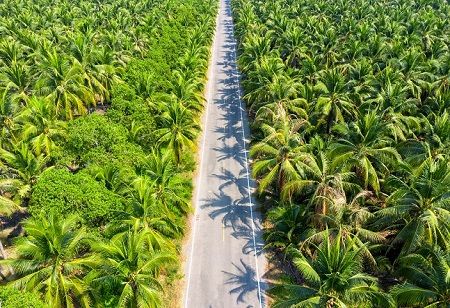
L'Oréal, a cosmetic and beauty company, has revolutionized the beauty industry using value-added processing. Their successful venture involves using argan oil in hair and skincare products. The cosmetic firm has realized the significance of argan oil and made significant investments in value-added processing techniques to extract, refine, and add it to a wide range of products.
Nowadays, byproducts of coconut are widely used in consumer products, catering to the needs of users and helping them in various ways. The global coconut products market is valued at USD 4.96 billion in 2024 and is anticipated to reach USD 7.98 billion by 2029, with a decent compound annual growth rate (CAGR) of 9.98 percent during the forecast period.
Currently, the coconut industry is undergoing a transformative change due to the use of value-added processing techniques. These advanced methods are propelling the industry towards remarkable growth and sustainability.
Value-added processing must be put into practice to leverage maximum benefits for coconut farmers. However, in developing nations, value-added processing has far-reaching consequences for farmers and needs to be taken care of. Farmers have to take an extra initiative in adding value to their production to set a fair price, which gives them a good return for processed coconut products and will pave the way to improve their economic resilience and livelihoods. Besides, by consistently adhering to the value-added practices, they can nurture their own business, make them more robust in setting up their processing plants, and get higher yields from the produce. Hence, the farmers have to comprehensively understand how adding extra value positively impacts their cultivation and production.
For instance, Nestle has made investments in value-added processing techniques for its range of coconut products which includes coconut milk, coconut water, and snacks made with coconut. By utilizing the latest processing techniques, the company has been able to create products of higher value, which in turn benefits the coconut farmers.
With the help of value-added processing, the coconut industry unlocks its more significant market potential by broadening its products to include milk, flour, oil, and many others, luring especially the health-conscious community across the globe. Nowadays, advanced technology plays a crucial role in making coconut byproducts utilized in several other industries, such as pharmaceuticals, cosmetics, and more, expanding their reach. As a result, technology has brought significant change that promotes coconut's value and creates a culture of following sustainable practices, improving the economic prospects for producers and farmers. Since the product is pure and organic, there is a spike in demand, and therefore, the coconut industry grows as a crucial player, taking care of the preferences of different consumers and assisting in economic development.
Vita Coco has seamlessly used value-added processing methods to extend its products and foray into new markets. By putting value through innovation, Vita Coco has formed a range of products that appeal to diverse consumer preferences. This product range broadening has enabled the firm to enter markets and take advantage of growing trends in health.
Dr. Then Kek Hoe, FGV R&D, Head of Agronomy & Strategic Crops said that "The coconut industry is driven by the rapid growth and significant demand of coconut based products globally, which has proven to generate greater economic returns for the coconut producers"
There can be a thought process in mind that the value-added processing will not only add value to redefining the economic landscape of the coconut sector, but it will also contribute to sustainability aspects. More importantly, it will also make use of several components of the coconuts, which consist of shells and husks, so that it lowers waste and improves resource allocation. Apart from this, the production activity of the value-added coconuts usually follows sustainable activities in the form of renewable energy utilization and organic farming, which will help reduce the risk to the industry's ecological footprint. Eventually, the coconut industry associated with value-added processing sets a benchmark for sustainable agriculture.
For example, Ben & Jerry's, a subsidiary of Unilever, has been adding coconut-based ingredients to its product offerings to account for its goal of sustainability. They have also incorporated value-added processing methods for coconut ingredients that are sustainably sourced and made.
Cutting-edge technologies play a vital role in improving the efficiency and scalability of value-added processing activities. In this modern era, advanced machines streamline the extraction process of multiple coconut derivatives with less energy consumption and less waste, contributing to product quality. Precision agricultural methodologies, such as sensor technology and drones, are optional, which help ensure significant growth while preserving resources. Besides, farmers can also utilize novel processing techniques that extract the greater-worth components such as flour, milk, and oil, fulfilling different consumer needs. Blockchain technology will nurture visibility in the supply chain process, establishing consumer trust. With the latest technology, the coconut sector experiences revolutionary change, reshaping ancient practices and opening the way for more excellent production in the tech era.
Coca-Cola utilizes high-pressure processing (HPP) technology, which involves treating coconut water to massive levels of pressure to kill harmful bacteria while maintaining the beverage's flavor and nutrients.
All in all, value-added processing remains the key in the coconut industry and acts as a catalyst for the smooth transformation of the sector, opening the way to new economic opportunities, improving the sustainability process, and empowering the lives of farmers dealing with coconut and the communities across the globe. Coconut is always a product of high demand, and the need to embrace advanced technologies is crucial to improving the process. It is also vital to have partnerships and sustainable practices to recognize the maximum potential of value-added processing to reshape the future of the coconut sector.
We use cookies to ensure you get the best experience on our website. Read more...